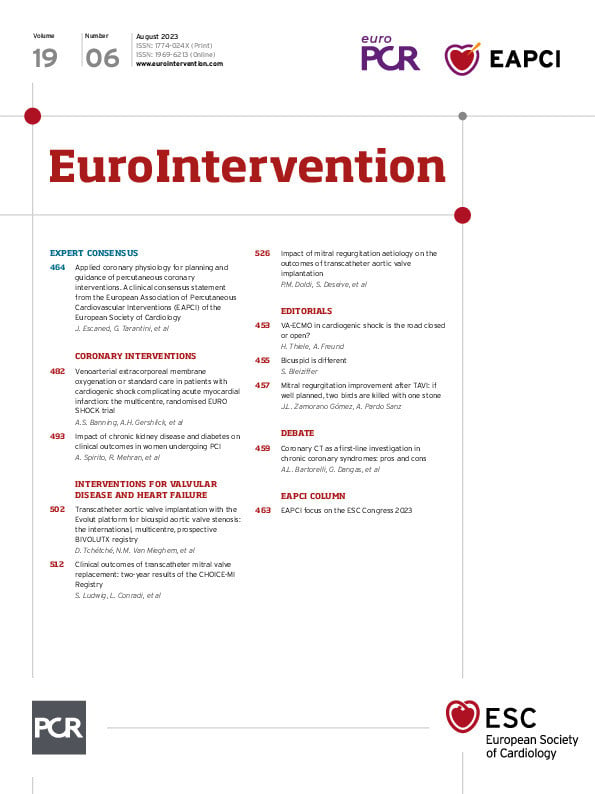This month, the wider cardiology community comes together in person in Amsterdam and online to learn about the newest developments, advances and evidence in cardiology at the European Society of Cardiology (ESC) Congress. The 2023 Congress in Amsterdam has been developed around the theme of “joining forces to protect the heart”, focusing on collaboration to meet the challenges we face today and to plan for the future of cardiology. The ESC Congress programme is developed in collaboration with the seven ESC associations, with work beginning immediately after the previous edition. The European Association of Percutaneous Cardiovascular Interventions (EAPCI) Scientific Programme and Congress Committee, chaired by Gabor Toth and Nicole Karam, has led the development of numerous exciting sessions for this year’s Congress. Many EAPCI members will play an active role throughout the Congress, be it presenting Hot Line clinical trials, clinical cases and abstracts as well as participating in the sessions.
A number of new ESC guidelines and updates will be presented during the Congress, notably including the highly anticipated 2023 ESC Guidelines on Acute Coronary Syndromes. In particular, many of us are looking forward to the updated evidence and recommendations for the investigation, diagnosis and treatment of myocardial infarction with non-obstructive arteries (MINOCA). The guidelines task force, chaired by Robert Byrne and Borja Ibanez, has worked extensively to complete this guideline, and it will be presented on 28 August at 08:30 in room Amsterdam. There will be an opportunity to interact with the authors in the “Ask the Guidelines Task Force” session in Hub Vermeer at 11:15 and a final “Guidelines in Practice” session in room Lisbon at 14:00.
There are numerous trials of interest to the community in this year’s Hot Line late breaking clinical trials. In particular, during Hot Line 3 on 26 August, the FIRE, ECLS-SHOCK and STOPDAPT 3 trials will no doubt provide topics of discussion for the remainder of the Congress. Intracoronary imaging will be extensively covered during Hot Line 4 on 27 August, with the ILUMIEN IV, OCTOBER and OCTIVUS trials being presented, which are all eagerly anticipated.
One of the highlights of the Congress each year is the “ESC Andreas Grüntzig Lecture in Interventional Cardiology”. This year’s lecture will be delivered by Irene Marthe Lang (Medical University of Vienna) on the topic of balloon pulmonary angioplasty for chronic thromboembolic pulmonary hypertension on 27 August at 10:15 in Hub Mondrian.
Cardiogenic shock remains one of the significant challenges in interventional cardiology, with the role of mechanical circulatory support not clearly defined. Pascal Vranckx and Agnieszka Tycinska will chair the “Great Debate” session on 27 August at 11:15 in Hub Vermeer. During this session, Alaide Chieffo (pro) and Jan Belohlavek (con) will debate whether “extracoporeal membrane oxygenation (ECMO) is indicated for cardiogenic shock complicating acute myocardial infarction”. The debate will surely lead to a lively interaction, with Holger Thiele moderating the debate.
Room Luxembourg will host a number of highly educational practical seminars covering a broad spectrum of topics in interventional cardiology including “Cardiogenic Shock” (26 August, 11:15), “Intracoronary Imaging & Physiology” (26 August, 16:30), “Myocardial Revascularisation: Percutaneous Coronary Intervention (PCI) vs Coronary Artery Bypass Graft (CABG)” (27 August, 11:15), “Dual Antiplatelet Therapy (DAPT) after PCI” (28 August, 11:15) and “Complex PCI in Practice” (28 August, 16:30). Finally, the ever-popular topic of complications and learning both how to prevent and manage them is covered in the session “PCI Complications: The Lyrics from My Worst Nightmares” on 26 August at 14:00.
The 2023 edition of the ESC Congress will surely be a highly educational event and provide our community with an opportunity to come together, share opinions and learn from each other.

